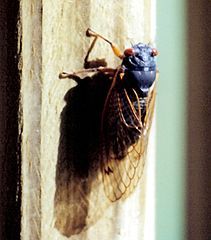Main Content
Sal Mangiafico, Rutgers Cooperative Extension
Some parts of New Jersey may be see large numbers of adult 17-year cicadas emerge this spring, with their distinctive dark bodies, red eyes, and noisy habits. After 17 years in the soil as immature nymphs, living on the sap of tree roots, the insects emerge from the soil together, find a tree or similar object to climb up, split their skins, and emerge as adults. They usually don’t cause substantial harm to trees, but the deposition of eggs can kill the twig in which the eggs are laid. For more information on periodical cicadas, see Rutgers Factsheet FS220, “Periodical Cicadas”, https://njaes.rutgers.edu/fs220/, or watch the short video “Periodical Cicadas Overrun the Forest” from the BBC’s Planet Earth, https://www.youtube.com/watch?v=EWr8fzUz-Yw.

Rutgers New Jersey Agricultural Experiment Station Cooperative Extension educational programs are offered to all without regard to race, religion, color, national origin, ancestry, age, sex, sexual orientation, gender identity and expression, disability, atypical hereditary cellular or blood trait, marital status, civil union status, domestic partnership status, military service, veteran status, and any other category protected by law. Rutgers Cooperative Extension encourages individuals with disabilities to participate in its programs and activities. If you need special accommodations, have questions about physical access, or require alternate means for program information, please contact your local Extension Office. Contact the State Extension Director’s Office if you have concerns related to discrimination, 732-932-5000, ext. 584.